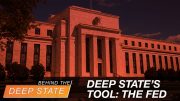
While headline stories about averting the dangers of an international “currency war” dominated news coverage of the recently concluded G20 meeting in Moscow, the real unreported story is that the global gathering of central bankers and finance ministers is pushing forward with their plan for “supersizing” the International Monetary Fund. The end goal is to transform the IMF into a global Federal Reserve, with the ability to flood the world with huge new volumes of loans and currency. It would also wield vast financial regulatory powers.
The IMF’s unit of account, or “currency,” known as a Special Drawing Right (SDR), is being readied for eventual adoption as the replacement for the U.S. dollar in international transactions, to lead the way toward eventual adoption of the SDR or some other designated unit as the global currency, much in the same way that the euro was foisted upon the people of Europe as a replacement of their national currencies.
The mainstream media seem intent on keeping the public fixated on the latest Kardashian frolics, sportsmania, and Democrat-Republican political mudwrestling, while coverage of the G7, G20, and IMF confabs that are determining the economic fate of the world receive short shrift. And the little reporting of these events that does leak out usually amounts to little more than regurgitation of the pre-scripted talking points of the conference principals. Over the past four years, The New American has published numerous articles detailing the radical plans currently underway for the total destruction of the dollar and the plans for supersizing the IMF into a global Fed. (See the linked stories at the bottom of this article).
Virtually unreported was IMF Managing Director Christine Lagarde’s comments at the close of the G20 Moscow summit on February 16 that she expected the IMF members to come through soon with the remaining funds necessary to double the IMF’s funds. Unknown to most voters and taxpayers the world over is the fact that their governments’ finance ministers agreed at the G20’s Korea meeting in 2010 to increase the “quotas” (contributions) of each member to the IMF, effectively doubling the IMF’s SDR assets to about $US 750 billion.
The IMF has also benefited immensely from another set of recent innovations that have received almost zero news coverage: the New Arrangements to Borrow (NAB) and the General Arrangements to Borrow (GAB).
Once activated, the IMF reports, the NAB “can provide supplementary resources of up to SDR 370.0 billion (about $567 billion) to the IMF.”
“The potential amount of credit available to the IMF under the GAB totals SDR 17 billion (about $26 billion),” says the same IMF web page.
With our national budget now being measured in trillions of dollars, the mere hundreds of billions of dollars the IMF is bandying about may no longer seem as impressive as it once might have. However, the IMF has much grander visions; this is just the start. As we reported previously, the IMF’s Christine Lagrande in February 2012 called for a trillion dollar “firewall,” including a European Stability Mechanism (ESM) for bailing out the collapsing economies of Europe’s socialist regimes. Finance ministers, including then U.S. Treasury Secretary Timothy Geithner, all took to chatting up the supposed necessity of the emergency “firewall.” As we reported at the time, acceding to these calls would be the equivalent of “giving even more matches and gasoline to the arsonists who have already burned through trillions of dollars in ‘quantitative easing’ and ‘stimulus’ funds.”
Following the Fed’s Example
Federal Reserve Chairman Ben Bernanke (shown above) told the Moscow G20 conference that the Fed would continue its inflationary policy of creating colossal sums of new digital dollars out of thin air, otherwise known as “quantitative easing.”
A Bloomberg report noted:
The Fed under Bernanke has expanded assets to a record exceeding $3 trillion and pushed down the benchmark interest rate close to zero….
The Fed last month affirmed a plan to buy $85 billion per month in bonds, seeking to foster growth and reduce a 7.9 percent jobless rate.
“We believe that by strengthening the U.S. economy we are helping to strengthen the global economy as well,” Bernanke told the G20 ministers, according to Bloomberg. “The Federal Reserve continues to provide accommodative monetary policy in our effort to foster maximum employment and price stability,” Bernanke said.
Photo: U.S. Federal Reserve Chairman Ben Bernanke ahead of G20 meeting in Moscow, Feb. 16, 2013: AP Images
Related stories:
IMF as Global Fed: G20’s Agenda Behind the Agenda
International Monetary Fund (IMF) Leader Calls for Trillion-dollar “Firewall”
IMF as Global Fed: G20’s Agenda Behind the Agenda
The G20 Push to “Supersize” the IMF
New International Financial System in the Offing?
Upcoming Financial Summit About Global Governance
Global Fusion: The G20, IMF, and World Government




